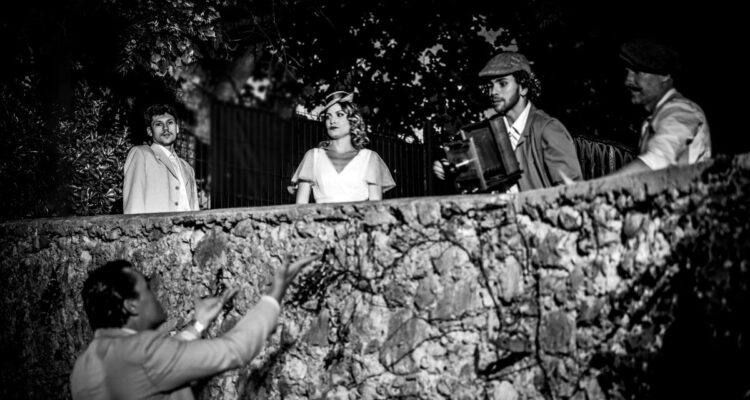The Gattières Opus Opera Festival in a small hillside village behind Nice has been a well-kept secret for 34 years! How refreshing to visit Gattières, for a spectacular view and to see open-air opera in Place Grimaldi. Opus Opera focusses on promising young singers at the beginning of their careers.
Rondine was chosen to commemorate the centenary of Puccini’s death.
Rondine was commissioned for Vienna, but WWI intervened and Rondine premiered in neutral Monte Carlo. After a lukewarm reception, it gained in popularity, premiering at the Met with Gigli. Puccini was dissatisfied with it, composing three versions with two different endings.
The story echoes La Traviata. Magda, a courtesan kept by wealthy Rambaldo, hosts a soirée. Prunier, a poet (in love with Magda’s maid, Lisette, despite her being well below his station), begins Doretta’s song. Magda completes it in the opera’s best-known aria, dreaming of flying like a swallow from her superficial Parisian life towards true love and sun. Ruggero, the son of Rambaldo’s friend arrives. Disguised, Magda goes to Bullier’s bar in the evening, meeting Ruggero. They fall in love. She leaves Rambaldo for Ruggero, without revealing who she is. Magda pretends to be a simple working girl, Pauletta.
In Act III, after living in bliss for a few months in Nice, Ruggero, penniless, writes to his parents asking for money and permission to marry Pauletta. Magda, distraught, realises this is impossible. This production uses the first ending – Magda leaves Ruggero, breaking his heart. The second ending – Rambaldo gives Magda money to finance her folly, knowing that his ‘swallow’ will return. Ruggero discovers who she is, and, repulsed by her deceit, abandons her. Rambaldo’s extra music adds to voice variety. Ruggero is not left unfairly broken-hearted. This ending is more powerful. Marta Domingo’s 1997 Bonn production used a third version, adding to the tragedy by Magda drowning herself in the final bars.
French/Austrian director Yohanna Fuchs updates Rondine into the world of cinema. Magda, an aspiring star, is torn between producer Rambaldo, and young director Ruggero. Lisette is the make-up girl. Exploring a world of illusion versus sincerity via cinema is an interesting concept, but the crux of Magda’s dilemma does not work. A wannabe starlet flitting from producer to director is not headline news, whereas Ruggero’s repugnance discovering Magda is a courtesan is pivotal to the story. The class difference is lacking. Prunier would not worry that a maid is below his station as Lisette is a make-up girl on his level. However, performed in Italian without subtitles, much of the audience neither knew the opera nor understood the words, and may not have noticed. Puccini would not have cared, once his royalties were paid!
Italian Chiara Polese’s light soprano has lovely pianissimi, but is better suited to Mozart than Puccini. She lacks the vocal palette and dramatic heft for Magda. Doretta’s song worked well in Act I, but Polese sounded thin in Act 3 compared with Ruggero, wonderfully sung by Chilean tenor Diego Godoy.
Godoy is the standout singer of the evening, with an exciting, dramatic voice, personality and varied vocal palette. He already has heavyweight roles such as Manrico under his belt. His aria, Parigi, é la città dei desideri – Paris the city of desires – is ravishing. He is a future star.
French tenor Valentin Thill as Prunier has an attractive voice and demeanour, with an additional good baritone quality lower range.
French bass-baritone Louis Morvan as Rambaldo has a wonderful rich quality, but wasted as this version gives him less to sing. He should have looked older – there is a generation difference from Ruggero! He looked miserable throughout.
French soprano Emy Gazeilles is perfect as Lisette.
Italian conductor Alice Meregaglia kept the proceedings light, but some tempi dragged, losing impetus instead of driving forward.
Thill, Morvan and Gazeilles all have good futures ahead of them.
When hearing Rondine – can you hear Puccini’s musical joke? In Act I, Prunier says he prefers composing songs about heroines like Salome (Strauss’s opera premiering 12 years earlier). Strauss’s distinctive 4-note Salome motif plays in the orchestra!
This is a great evening out. The audience was ecstatic. Make sure to include Opus Opera if you find yourself near Nice next July. Highly recommended.
Music by Giacomo Puccini (1858-1924)
Libretto Giuseppe Adami based on libretto by Alfred Wilner and Heinz Reichert
Conducted by Alice Meregaglia
Directed by Yohanna Fuchs
First performance Opéra de Monte Carlo 27th March 1917
Cast includes Chiara Polese, Diego Godoy, Louis Morvan, Emy Gazeilles, Valentin Thill, Noelia Ibàñez, Cécile Lo Bianco, Rachel Duckett, Pascal Terrien
Running time 2 hours 25 minutes with one interval
Last performance: 4th August 2024
Photo Credit Jean-Marc Angelini,

